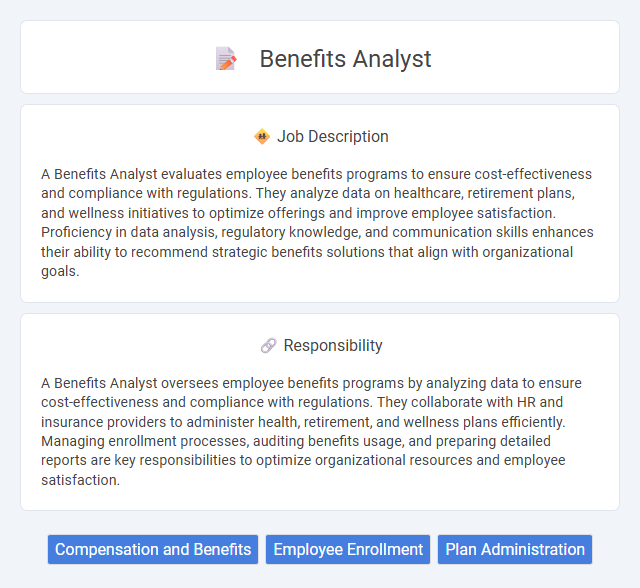
A Benefits Analyst evaluates employee benefits programs to ensure cost-effectiveness and compliance with regulations. They analyze data on healthcare, retirement plans, and wellness initiatives to optimize offerings and improve employee satisfaction. Proficiency in data analysis, regulatory knowledge, and communication skills enhances their ability to recommend strategic benefits solutions that align with organizational goals.
Individuals with strong analytical skills and a detail-oriented mindset are likely suitable for a benefits analyst job, as the role involves evaluating employee benefits programs and ensuring compliance with regulations. People with a background in human resources, finance, or data analysis may have a higher probability of success due to the need for interpreting data and communicating complex information effectively. Those who prefer routine and structured tasks might find the position aligns well with their work style, while individuals who thrive in highly dynamic or creative environments may find it less fitting.
Qualification
A Benefits Analyst typically requires a bachelor's degree in human resources, business administration, or a related field, with certifications such as Certified Employee Benefits Specialist (CEBS) enhancing professional credentials. Strong analytical skills, proficiency in benefits administration software, and knowledge of labor laws and compliance regulations are essential for accurate benefits management. Experience in data analysis and report generation supports effective decision-making and ensures alignment with company policies and employee needs.
Responsibility
A Benefits Analyst oversees employee benefits programs by analyzing data to ensure cost-effectiveness and compliance with regulations. They collaborate with HR and insurance providers to administer health, retirement, and wellness plans efficiently. Managing enrollment processes, auditing benefits usage, and preparing detailed reports are key responsibilities to optimize organizational resources and employee satisfaction.
Benefit
A Benefits Analyst likely plays a crucial role in optimizing employee compensation packages by evaluating and improving benefit plans, which may increase overall job satisfaction and retention. They probably analyze data to identify trends and recommend cost-effective solutions that maximize value for both employees and employers. This position seems essential in ensuring competitive benefits offerings that align with organizational goals and regulatory compliance.
Challenge
A Benefits Analyst is likely to face the challenge of continuously interpreting complex healthcare regulations and employee needs to design effective benefits plans. Navigating the balance between cost management and employee satisfaction can require strong analytical skills and strategic thinking. The role probably demands adaptability to evolving industry trends and regulatory changes to ensure compliance and optimize benefit offerings.
Career Advancement
Benefits analysts play a critical role in managing employee compensation and benefits programs, directly impacting organizational efficiency and employee satisfaction. Expertise in data analysis, regulatory compliance, and benefits strategy enhances career advancement opportunities into senior human resources, compensation management, or employee relations roles. Mastery of benefits technology platforms and staying current with industry trends significantly increases a benefits analyst's potential for leadership positions and higher salaries.
Key Terms
Compensation and Benefits
Benefits analysts play a critical role in managing and optimizing employee compensation and benefits programs to ensure competitiveness and cost-effectiveness. They analyze salary structures, health insurance plans, retirement options, and other perks to align with industry standards and organizational goals. Expertise in data analysis and regulatory compliance drives informed recommendations that enhance employee satisfaction and retention.
Employee Enrollment
Benefits analysts specializing in employee enrollment streamline the process by managing data accuracy and ensuring compliance with regulatory requirements. They analyze enrollment trends to optimize plan offerings and improve employee satisfaction while reducing errors and administrative costs. Expertise in benefits software and cross-department collaboration enhances seamless onboarding and timely benefits activation.
Plan Administration
Benefits analysts specializing in plan administration manage employee benefit programs, ensuring compliance with regulatory requirements such as ERISA and the Affordable Care Act. They analyze plan performance, handle enrollment processes, and coordinate with vendors to optimize cost-efficiency and coverage quality. Expertise in data analysis and benefits technology platforms is essential for maintaining accurate records and facilitating seamless benefit delivery.
 kuljobs.com
kuljobs.com